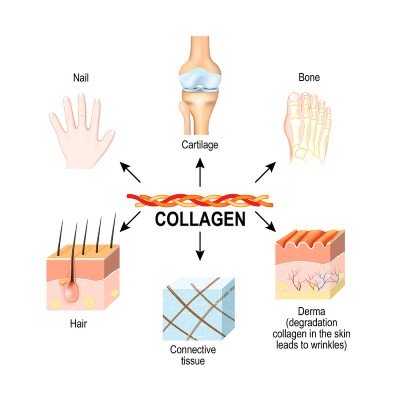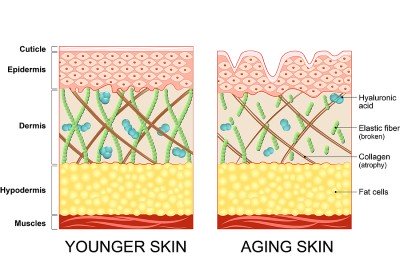Collagen supplements are the rage right now, with claims of fewer wrinkles, a full head of healthy hair, and thicker nails. It’s big business, but does it deliver what it claims. Here’s the scoop so you can decide for yourself.
Download On Track with Barix: Are There Benefits to Collagen Supplements After Weight Loss Surgery?
 What is Collagen?
What is Collagen?
Collagen is the form of protein most abundant in the body – making up about a third of the total protein mass. It provides structure, strength, and stability and is found in joints, bones, teeth, and skin.
Collagen is a family of proteins. There are 28 different types of collagen, each with a unique amino acid (protein building block) combination. Collagen is rich in three non-essential amino acids, lysine, glycine, and proline.
As a Protein Supplement
Collagen is an incomplete protein, meaning it does not include all the essential amino acids that the body needs. Better options to reach protein goals include low-fat meat, fish, poultry, dairy products, whey protein supplements, or soy products.
 Collagen and Skin
Collagen and Skin
In the skin, collagen provides structural support and elasticity, giving the skin a healthy appearance. People make less collagen each year, starting at age 20. As collagen declines, structural support and elasticity are reduced, fine lines, wrinkles, and sagging skin begin to appear.
Collagen and Hair Growth
Collagen plays a significant role in maintaining healthy hair follicles. It is found in the skin surrounding each hair follicle. During the growth stage, the amount of collagen surrounding the hair bulb thickens. And then naturally thins as the hair follicle goes into the resting stage.
In the case of thinning hair after bariatric surgery, stress, rather than a collagen deficit, is likely the cause. The surgery itself, followed by a low caloric intake and the resulting rapid weight loss, creates stress in the body. This stress can cause more hair strands to go into the resting phase than usual and then 3-4 months later fall out. Hair grows back once the condition that caused the hair loss is corrected, although it can take months before the hair returns to its previous thickness.
More Collagen In Doesn’t Necessarily Equate to More Body Collagen
When collagen is consumed from an animal product or supplement, it is broken down into single amino acids. Those amino acids are put together in different combinations to make whatever proteins, including any collagen the body needs. The amino acids may form enzymes, hormones, make red blood cells, or other needs the body has. It may not be used to plump up the skin or promote lush locks.
 The body will form more collagen with a balanced diet of protein-rich foods and a variety of fresh fruits and vegetables. Nutrients that may support collagen production include:
The body will form more collagen with a balanced diet of protein-rich foods and a variety of fresh fruits and vegetables. Nutrients that may support collagen production include:
- Adequate protein intake. The amino acids that make up collagen are non-essential, meaning the body can produce them if it has the right building blocks.
- Foods rich in vitamin C like oranges, strawberries, peppers, and broccoli.
- Copper-rich foods like shellfish, nuts, and red meat.
- Dark green leafy and orange vegetables for vitamin A.
Limiting Collagen Breakdown
Collagen production naturally decreases with age. Although science has yet to figure out how to slow aging, other factors that lead to lower collagen levels are generally within our control:
- Excess sun exposure
- Smoking
- A poor diet
- A high sugar intake
- Excess alcohol intake
What Do the Studies Show?
Most health professionals agree that the studies into the effectiveness of collagen supplements for skin or hair health are lacking. Those that have been done have small numbers of participants and are often funded by supplement companies.
Potential Downside
Manufacturers of collagen supplements don’t have to prove their effectiveness or safety before selling them.
Collagen supplements come from animal collagen especially, bones, skin, and fish scales. These can potentially contain toxic heavy metals.
U.S. consumers are expected to spend $293 million on collagen products in 2020.
Yet, there is Some History
In China, women have considered collagen a fountain of youth for centuries. They consume collagen sources like pig’s feet, shark fins, and donkey skin. They must believe there is some benefit.
Gelatin, a cooked source of collagen, has been a long-standing treatment for hair, skin, and nails in the United States.
And the Word-of-Mouth Testimonials
Some people swear by collagen supplement. They feel their hair and skin improve significantly after taking supplements.
The Bottom Line
There is no good research showing the effectiveness of collagen supplements. The studies that have been done are often funded by the supplement companies themselves. However, there is some history to the use and a lot of word-of-mouth testimonials.
If you decide to give it a try, buy from a reputable manufacturer and let us know what you think by posting on the Barix Clinics Facebook Support Group.

